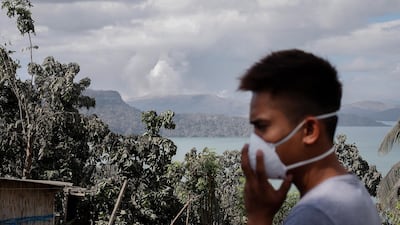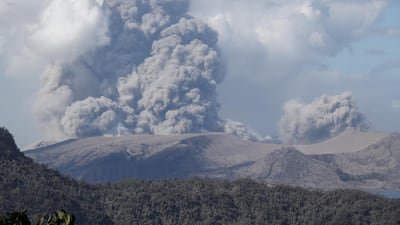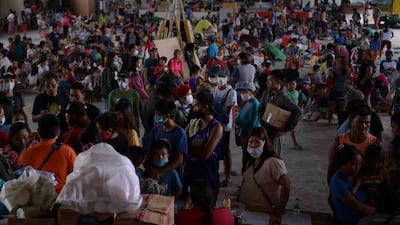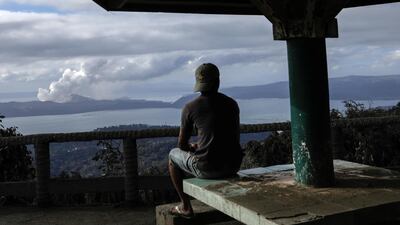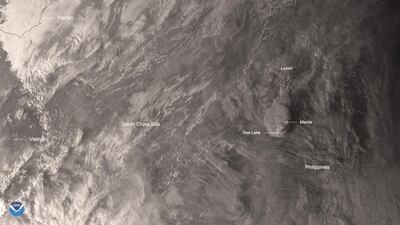Filipinos in the UAE have spent the past few days glued to their phones, nervously hoping for news from their families, after a volcano eruption brought the country to a standstill on Sunday.
Taal spewed fountains of lava 800 metres into the air on Tuesday and experts believe a more perilous eruption is due.
The scenic volcano in the middle of a lake in Batangas province, south of Manila, rumbled to life on Sunday in a powerful explosion that blasted a 15-kilometre column of ash, steam and pebbles into the sky.
Clouds of volcanic ash blowing over Manila, 65 kilometres to the north, closed the country’s main airport, leading to the delay or cancellation of more than 500 flights.
Filipinos in the UAE have been worried for their families and friends, many of whom have been moved to evacuation camps or have fled to stay with relatives in other parts of the country.
Richard Lester, a project administrator in Dubai, was visiting his family in the Philippines when the volcano erupted.
Their home is 50km away from the volcano and he has been volunteering at an evacuation camp as a medical assistant since Sunday.
“We are not as badly affected. Some places, especially on the island where Taal volcano is located are extremely affected," said Mr Lester, 29.
"There are volcanic eruptions even now as well as earthquakes and aftershocks, and houses are full of ash.”
He said the neighbouring areas were being rocked with aftershocks every few hours.
"The ash is still falling on the houses and they are calling the place a ghost town.”
Mr Lester said he had heard many tales of people whose homes were destroyed leaving them with nothing.
"Those people cannot go anywhere. They cannot go back home as their houses are damaged.
"They do not have any options.”
Mr Lester plans to return to Dubai next week — unless his flight is cancelled.
Paul Cortes, Philippines consul general to Dubai and the Northern Emirates, said they had received a lot of messages from residents asking how they could help.
"We do have a lot of community members asking what they can do to help out and to arrange relief goods. This is very heartwarming because we see that the Filipino community is not forgetting their countrymen in times of trouble.
"Sadly, we are geologically placed at that edge of the world where we are prone to earthquakes, typhoons, flooding, and volcanic eruptions.”
Jenelee Austria was at work in Dubai when she heard about the eruption. Her main concern was her grandmother, who is over 70 years old, has asthma and lives near the volcano.
"Many of my extended family members live in San Nicolas, which is located just behind the volcano, around three kilometres away,” said Ms Austria, 32.
She said her aunts and uncles fled to stay with relatives across the country along with a newborn who was taken to Batangas city.
"They do not know when they will return to their homes," she said. "The town looks like a ghost-town as it’s full of dust and ash."
Albert Tenorio, who works at a call centre in Abu Dhabi, feared for his family in Talisay, which was heavily affected by the eruption.
"My family is at the evacuation centre and the most important thing is that they are safe," he said, adding that his family have food and clothes, and tried to save crucial belongings including personal documents.
"My home town is destroyed by the ash."
Mr Tenorio, 28, was at work when he received a flurry of frantic messages from his family.
"Everything happened so fast.
"We did not know what would happen next and the people were not ready," he said.
He said he was extremely worried when he saw the alerts.
"We are very thankful to the Filipinos who helped those who have been impacted.”



